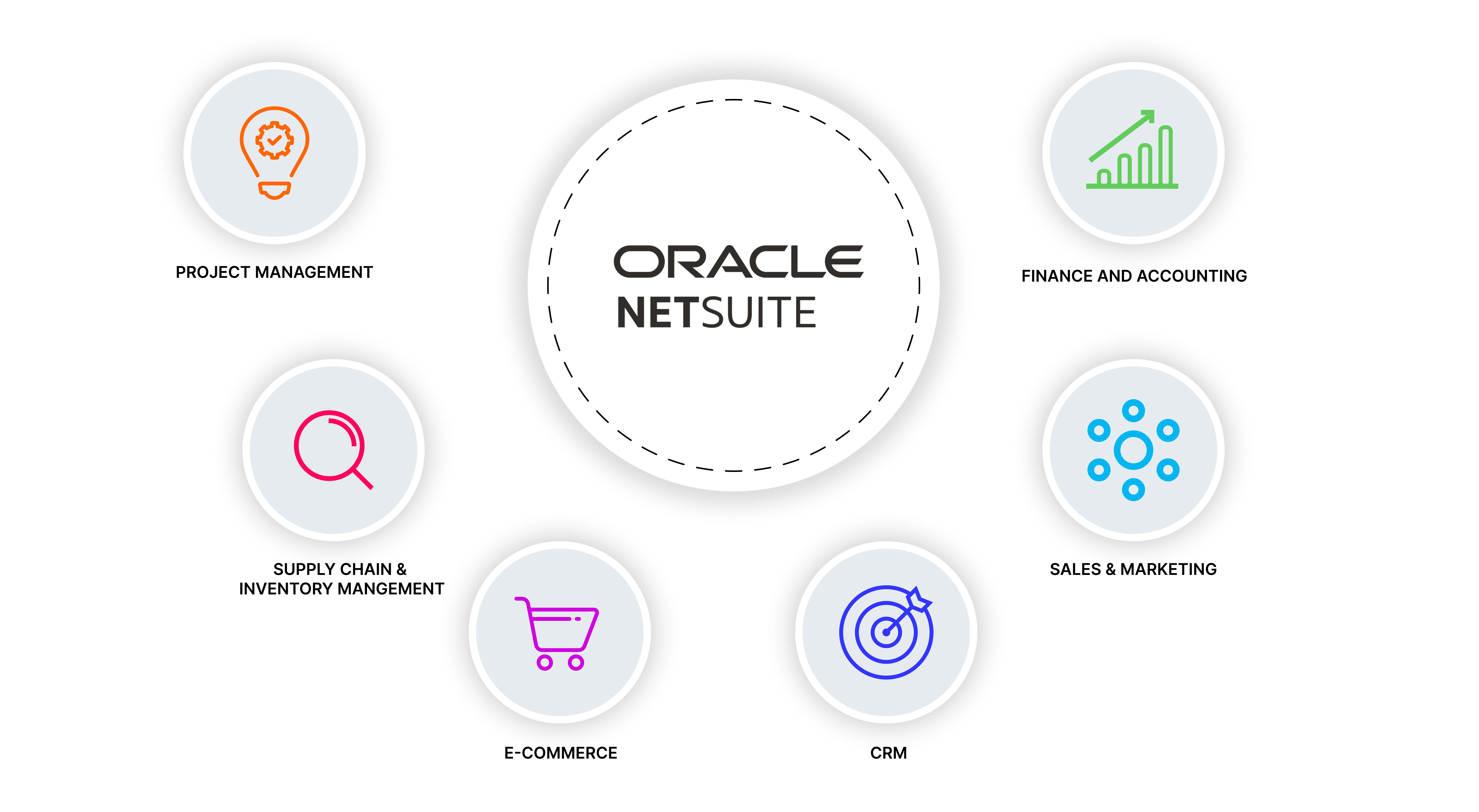
10 Reasons Why SMEs Should Adopt NetSuite Cloud ERP
Updated on : 03 Oct 2022
Published : 03 Oct 2022
KPI

TABLE OF CONTENTS
TABLE OF CONTENTS
Introduction

Are your outdated legacy systems bogging you down? Despite spending sizable time and money, they do not help improve your business’s bottom-line results and productivity. Typically, legacy software systems need manual entry and costly workarounds, which compromise efficiency. Replacing these outdated systems with cloud ERP can result in fewer workarounds.
What is it about traditional on-premise ERP that SME companies are so hesitant about? The size, cost, and lengthy implementation process? Cloud technology has changed how businesses access data and ERP software. Instead of buying typical "out of the box" ERP software, companies are now investing in cloud-based ERP software. Cloud technology is convenient, flexible, and affordable. Due to its ability to meet small and medium businesses' unique requirements, many consider investing in cloud ERP software worthwhile.
Benefits of Implementing Cloud ERP for SMEs
1. Unified Business View
Often, organizations track and record information using one software program, while accounting teams use another, and HR departments use a different platform. This results in scattered information across data silos where teams have limited visibility. Cloud ERP solves the most significant challenge - Data Consolidation!
A cloud ERP system enables the management to make informed decisions using real-time business intelligence. This is where the NetSuite ERP system can help your organization gain an instant competitive advantage. The NetSuite ERP system allows for smooth operations in an enterprise. NetSuite brings approvals and workflows together. It also ensures every workflow is in an organized digital framework.
2. Cost-Efficient
Managing various platforms is a costly affair. By using a cloud-based ERP solution, such as NetSuite small businesses can reap various benefits, including reduced costs. The obvious advantages of cloud ERP include convenience and efficiency. Also, it eliminates upfront costs and uses a flexible subscription model. For example, in QuickBooks, customization is not available until you sign up for the most expensive subscription. Cloud ERP is customizable on the go and does not need extra hardware.
3. Encourages Transparency
Lack of transparency can affect a company's finances by reducing productivity, lowering quality, and causing higher turnover rates. Cloud ERP systems can help your organization cultivate a transparent work culture. A cloud ERP system like ERP NetSuite can map dependencies, track progress, raise alerts about areas requiring attention, and update employees and management on business performance metrics across functions and departments in real-time.
4. Empowers Automation
Cloud ERPs provide decision-makers with automated work file management and reporting capabilities. It would be highly time-consuming to process documents and prepare reports without a cloud ERP system. Excel, for instance, has problems with broken formulas, misplaced data, and lost files. Similarly, QuickBooks lacks a lot of industry-specific features.
Cloud ERP customizations help employees to automate a lot of manual tasks. For example, cloud ERP provides complete visibility into financial data across the entire business to support smart, informed decisions.
5. Instant Data Availability
Companies cannot afford to rely on inaccurate data. Data is crucial for companies, and they cannot risk losing or misinterpreting it. Inaccurate data analysis results in poor business decisions, impacting how a business performs. For example, a large amount of data might slow down Excel, if it is all contained in one file.
Furthermore, when employees manually change Excel, the risk of introducing errors increases. We live in a world where data is the king and the power lies in utilizing that data in real-time and making crucial decisions. This is where Cloud ERP can prove highly beneficial. Having real-time data that is accurate and up-to-date is a boon for decision-makers. It helps them gain a 360-degree perspective of the business scenario. It also ensures strategic decisions that benefit the organization by increasing revenues.

6. Security & Disaster Management
Data security is a major concern for many industries, especially when security is dependent on external vendors.
Undoubtedly, cloud-based ERP providers offer greater security and compliance than traditional ERP providers. Data is typically encrypted end-to-end by cloud providers with enterprise-grade security.
7. Enhanced Accessibility, Collaboration & Agility
The primary concern for businesses nowadays is how to make their system accessible to their employees. How do teams maintain collaboration in WFH situations? How with ERP SMEs can secure their data?
In the current times, when more employees work from home, businesses of all sizes are becoming decentralized. A cloud-based ERP provides improved accessibility, usability, and mobility. A cloud-based ERP system offers a high degree of corporate agility as your team can collaborate on the move. It allows employees to access tools from anywhere, anytime, and on any device, provided they have an internet connection.
With NetSuite, small businesses can have full visibility into inventory and supply chain channels to avoid disruptions and subsequent issues.
8. Boosts ERP Performance
Cloud ERP allows you to free up onsite space and resources, which companies might otherwise use for large and expensive setups. Also, because it is online, it frees up your in-house computation work for other tasks.
An exceptional ERP software must have easy third-party integration capabilities because it can take months to develop similar features on your own. Third-party integrations allow you to decentralize business processes and automate workflows efficiently. For example, QuickBooks integration options are limited. Whereas, ERP NetSuite offers many third-party integration options.

9. Saves Time for Additional Tasks
Time is a scarce asset, and no organization can afford to waste it. Keeping this in mind, cloud-based ERP systems are built that allow businesses to lower overheads and better utilize their time.
For example, if you are using Excel you probably know that it requires a lot of work hours along with a high learning curve. You have to enter every business expense manually, which is tedious and leads to manual errors. In contrast, you can manage accounting, HR, billing, operations, and more from a single application with the NetSuite ERP system. ERP NetSuite also provides an in-depth analysis of business activity with personalized dashboards. It also reduces manual processes by automating them to save time and resources and identify new opportunities.
10. Reduce Dependency on Internal IT Teams
When an organization migrates to a cloud-based ERP system, it can significantly impact its internal IT department. Running an ERP from the cloud is usually easier and faster, whereas on-premise ERP systems are difficult to maintain. How does this affect your internal IT team? First, it will allow the IT team to spend valuable time on higher-value activities and company outcomes.
In Excel, for instance, recovering all the data would be very difficult in the event of an unexpected event leading to data loss. IT teams would not easily be able to maneuver the system to retrieve the data. With cloud-based ERP software, small to midsize businesses can leverage their internal IT team more effectively. Businesses can drastically reduce implementation times with Cloud ERP. It does not require selecting hardware, hiring and training IT staff, or creating new data security protocols. They are more straightforward to implement for a business than traditional solutions.
How NetSuite Can Help Streamline Your Business
In case you're wondering - What is NetSuite ERP? Then let me explain - ERP NetSuite is a cloud-based business management system that automates core business processes. NetSuite gives real-time visibility into financial and operational performance to help organizations succeed.
The NetSuite ERP system is the world's most deployed cloud ERP solution. NetSuite ERP is available in 200 countries with 27 languages. With over 32,000 customers, ERP NetSuite is the perfect choice for managing your business. Manage your business processes better with ERP NetSuite. Moreover, you can access your business data anywhere, anytime.
Contact us to Transform your business with NetSuite ERP today!
